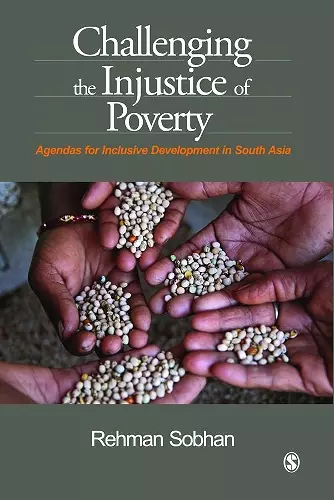Challenging the Injustice of Poverty
Agendas for Inclusive Development in South Asia
Format:Hardback
Publisher:SAGE Publications India Pvt Ltd
Published:10th Nov '10
Currently unavailable, and unfortunately no date known when it will be back

This book explores issues related to poverty in South Asia in a two-pronged manner-by focusing on injustice created and perpetuated by the unjust nature of a social order as its source and then providing concrete suggestions about how policymakers may move to challenge these injustices.
Drawing research inputs from studies across various South Asian countries, the book redefines poverty as a process where certain sections of the society are excluded from equal participation in development opportunities as well as decision-making. It further identifies a variety of operational ideas for policymakers, political activists and civil society advocacy groups committed to build a more just and poverty free society in South Asia
One can learn a lot from reading this book. It will open a debate on poverty alleviation once again in South Asia. It is certainly a significant piece of work on mainstreaming the poor via corporate assets and working out innovative collective arrangements. The book is a distillation of Sobhan’s thoughts over his lifetime of reading, thinking, pondering and acting. He has combined great analytical skills with deep research, and brought home some key issues that determine poverty in the South Asian region. It is a must read for all those who are interested in the subject.
-- Social ActionChallenging the Injustice of Poverty is a significant contribution to literature on poverty eradication strategies in South Asia. This work makes for fruitful reading for all those interested in developing such strategies and will enhance their knowledge of structural change as a mean of inclusive development. The most admirable feature of the book is that the work is based on conceptual as well as empirical analysis.
-- DawnIt would be pity if Rehman Sobhan’s book Challenging the injustice of poverty is left unread for being considered too dull and too heavy a read. It is indeed heavy, with imprints of a researcher all over the place... [The book] has over 70 pages of annexures and bibliography…. Challenging the injustice of poverty is like a ready document for South Asian government to tap and do the needful. There seems to be no other meaningful way to challenge poverty.
-- Outlook BusinessSobhan’s thesis is a well-conceptualised, well-executed document that puts forth some concrete proposals that are capable of taking forward the global fight against poverty and social exclusion on a specific trajectory. It can serve as a blueprint which the policy leaders can rely on. But the need of the hour is the political will to shake up the policy agenda of the governments of the developing world with a view to promoting and sustaining inclusive development and growth.
-- The New Indian ExpressThe author has combined great analytical skills with deep scholarship and brought home some key factors that determine poverty in the South Asian region. It is a must read for all those who are interested in poverty eradication through various tools enunciated by the author.
-- The TribuneThe book is an outcome of six years of untiring work specifically on the subject, conducted jointly by the Centre for Policy Dialogue (CPD), Bangladesh and South Asia Centre for Policy Studies (SACEPS), Nepal…. The arguments developed in this book are an outcome of comprehensive research and extensive dialogue…. Once can learn a great deal from reading this book. It will open a debate on poverty alleviation once again in South Asia…. It is indeed a remarkable piece of work on mainstreaming the poor via corporate assets and working out innovative collective arrangements. The book is a distillation of Prof. Sobhan′s thoughts over a lifetime of reading, thinking, contemplating and acting. He has combined great analytical skills with deep scholarship, and brought home some key factors that determine poverty in the South Asian region. It is a must read for all those who are interested in the subject.
-- Saman KelegamaProf. Rehman Sobhan…has challenged policymakers, the hordes of the excluded and their advocates in the region to address the biggest threat to democracy, economic stability and human rights in South Asia – Poverty…. This is an excellent summary of the schemes for reducing poverty devised by the World Bank, IMF and the International Development Community from Washington Consensus to Millennium Development Goals, proposals for promoting equity, some success stories from Asia, SAARC initiatives on poverty, the PRSPs in South Asia and India′s recent experiments in poverty reduction…. In order to promote the vitally needed agrarian reforms, Prof. Sobhan pleads for a national commission in each South Asian country and lays down its agenda…. Prof. Sobhan finds a great deal of potential for mitigating the problems of the small producers among the excluded through their collective action. Several successful models in India (ITC, Amul, Sewa) and Bangladesh (Pran, Brac) and dairy cooperatives in Nepal and Sri Lanka and women’s collective action, are analysed…. After a fairly detailed discussion on budgetary and financial policies for poverty eradication and some stimulating arguments for broadening of assets through collective action that address the problems faced by the most vulnerable groups.., the author takes up the question of institutions that can promote collective action by the excluded…. Professor Sobhan’s monumental study must generate an intensive debate on South Asian people’s poverty.
-- The Daily StarThis book will open a debate on poverty alleviation once again in South Asia where there are already two Independent South Asian Commission on Poverty Alleviation reports and as per the 13th SAARC Summit declaration, SAARC countries have geared themselves to achieve SDGs (SAARC Development Goals) by 2015 (in addition to the MDGs). It is indeed a remarkable piece of work on mainstreaming the poor via corporate assets and working out innovative collective arrangements.
-- The Book ReISBN: 9788132104681
Dimensions: unknown
Weight: 710g
516 pages